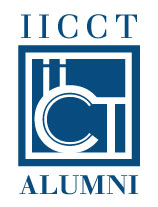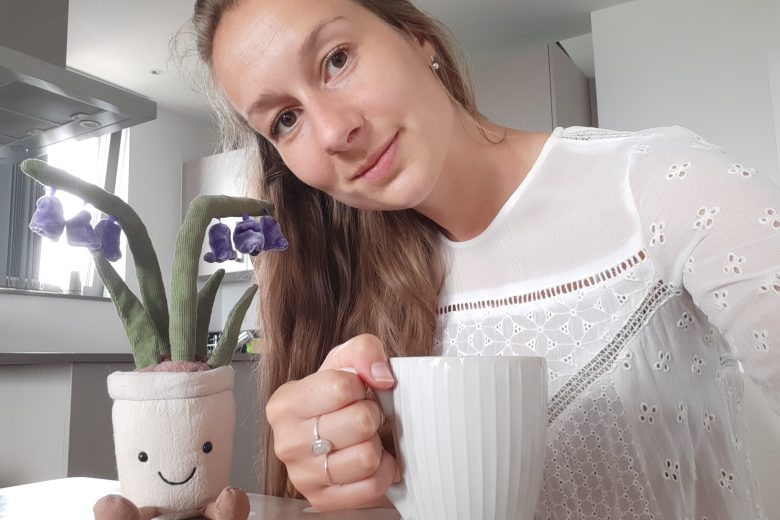I. BEING YOU
What is your name? My name is Chloe Bianeis
Where do you live? I currently live in Central London. I grew up in a small island called Belle-île en mer in Brittany, then I studied in Rennes, in Granada south Spain, in Lyon, and I also had a few months experiences in Madrid, Malta, and Ibiza.
What do you do for a living? I’m a French translator. I translate Spanish and English written content into French, for clients from different fields.
Where people can reach you or follow your work (contact, social media…)
LinkedIn: www.linkedin.com/in/chloe-bianeis
II. BEING CHOCOLATE TASTER
How did you decide to become chocolate taster?
Chocolate found me? After talking to a fellow translator who specializes in translation for the wine industry, I found it interesting and I though we don’t import much wine in France, but there could be a demand for quality chocolate and tea translation from English and Spanish into French. Many cacao producing countries speak Spanish or English.
So, on top of my love for these 2 products and my humble previous knowledge of it, I decided to learn as much as I could about it to be the go-to French translator for tea and cacao related content.
Another reason that supported this decision is my experience in international development and cooperation and the non-profit sector, which is also good to have as agriculture, conservation, human rights, children’s rights, community projects, livelihoods, etc. are topics I’m used to translate.
I’d say it’s 50% professional reasons, 50% pure personal passion.
I’ve always loved chocolate and tried to buy nice ones, but as soon as I learnt more about cacao and bean-to-bar, it became a passion I started sharing it through bars and conversations with family, friends, colleagues and network.
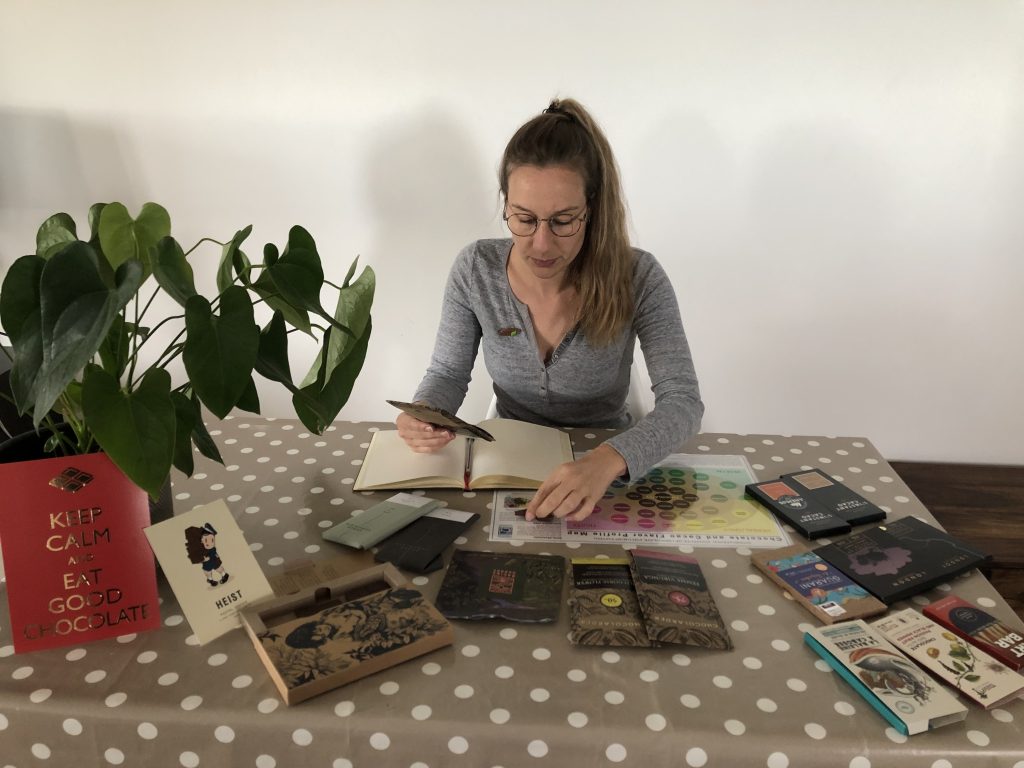
What do you love the most about being chocolate taster?
The surprise. You never know what is going to happen to your senses. Sometimes you’re taken through a surprising sensory journey. And the social part of it. Tasting alone is great but sharing opinion and excitement around chocolate bars is such a great feeling.
What is the one thing you want people to learn and remember about chocolate?
Real chocolate is GOOD AND GUILT-FREE. Here’s why: Real chocolate is much more diverse and delicious than that thing we were made to think was chocolate. It’s not bitter. It’s healthy. It doesn’t violate human rights or involve child labour. It doesn’t harm the planet because its production doesn’t involve deforestation and is compatible with biodiverse ecosystems. You can read more about it on this post: https://www.linkedin.com/feed/update/urn:li:activity:7140996362308841472/
III. BEING IICCT ALUMNI
How long have you been an IICCT member?
Since I took my IICCT Level 1 & 2 Cacao Evaluation course in Spring 2023.
What do you like the best about IICCT Alumni group?
In-person gatherings, like the Alumni Forum I attended last year in Valencia, Spain, or the online talks. I was actually lucky enough to win a box with 15 bars made by Spanish makers at the Forum in Valencia, which was a dream for a taster.
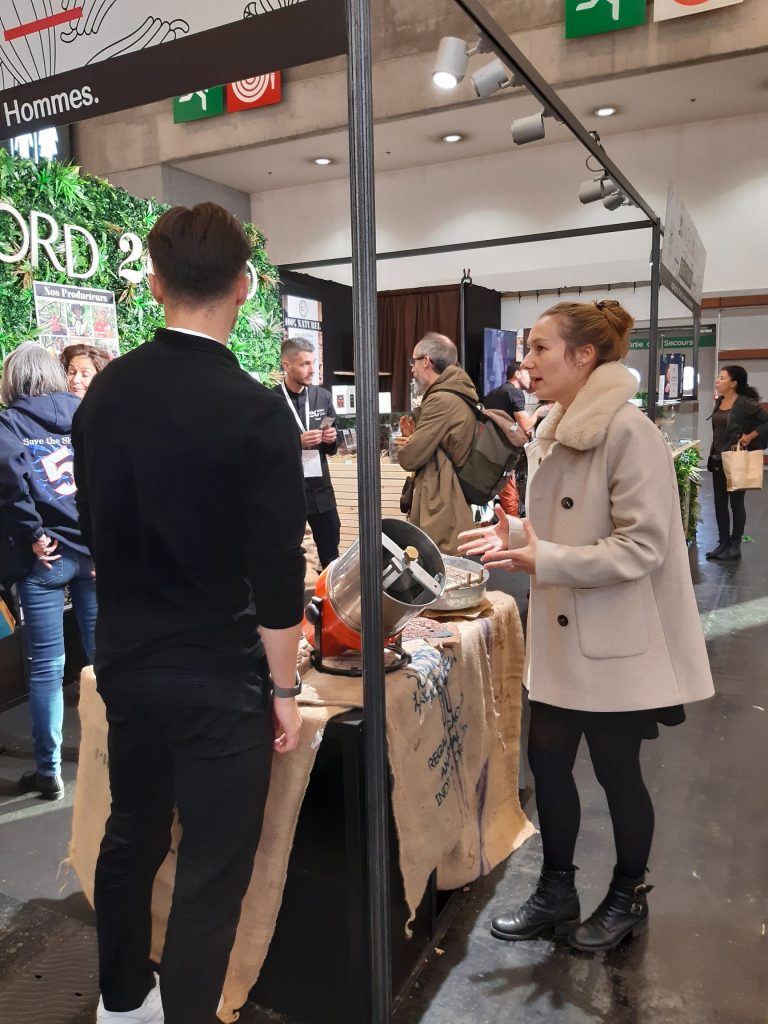
What would be your advice for new chocolate tasters?
Taste, taste, taste, everywhere you go, and talk to the makers (and farmers if you can). Practice tasting alone and group tastings. You learn and get different things from it. My background in cacao evaluation has helped me spot flavour notes and defects when it comes to tasting chocolate.
How do your career in translation and your passion for chocolate and cacao testing intersect and influence each other
My translation career has introduced me to diverse cultures, each with unique tastes and expressions. This exposure enhances my vocabulary and deepens my understanding of how language influences the perception of chocolate and cacao.
Although the research has found scientific grounds with substances responsible for some key flavor notes mentioned by people when tasting chocolate, we know taste is mostly subjective. That’s because what we feel (or don’t feel), and the words we use to describe taste is linked to our experience and memories and how we associate different tastes (analogies).
For instance, during a taste experience in my cacao evaluation course, I realized I could “taste” tomatoes” when having olive oil. That’s because my brain associated these 2 ingredients. So I might mention tomato flavor notes in chocolate if it comes first to my mind, when someone else might mention olive oil.
As I’m deepening my knowledge of craft chocolate across the UK, France and Spain, I’ve noticed that we don’t like the same things, and we describe chocolate differently. This happens with wine too.
Did you know bean-to-bar chocolate follows different trends in each country? French people like their chocolate smooth and velvety (“fondant”, “onctueux”, “lisse”, “soyeux”… we actually have many words to describe it). So many bars have some extra cocoa butter added to it.
Some textures and flavour notes might be appreciated in one country and not in the other. And the words used to describe chocolate can be quite different too. Each country has its own cuisine and tastes, and its own way to describe flavour. The words used to describe chocolate are linked to national cuisines, ingredients and plants. For instance, French or Spanish speakers would probably not mention marmite, or peanut butter and jam.
Most British and French people don’t know níspero fruit, which grows in many backyards in Spain.
I selected a few examples of words frequently used to describe chocolate in English, French, and Spanish, that you maybe find less often in the other languages.
| English | French | Spanish |
| aftertaste fudge molasses brownie sherbet/sherbetty crisp (used a lot to describe wine) light rich dairy malty maple syrup peanut butter and jam sandwich nutty liquorice pungent winey sour | longueur en bouche fondant lisse onctueux soyeux beurre noisette rond boisé tourbe vineux (usually not in a good way, when winey can be used to describe nice flavour notes in English) | azahar panela pasas miel caña de azúcar hierbas crema licor (de cereza, etc) flores blancas |
IV. BEING CHOCOLATE LOVER
What was the latest chocolate you tasted that really delighted you?
The lastest chocolates I tasted were from Chocolarder during an escape in Cornwall. A 50% infused with gorse flower, that gives great coconut flavour notes. I usually don’t like milk chocolate but I enjoyed this one. I also tried a few others they make. Their 100% (Peru) is really good, but my favorite Chocolarder bar is 80% (Madagascar).
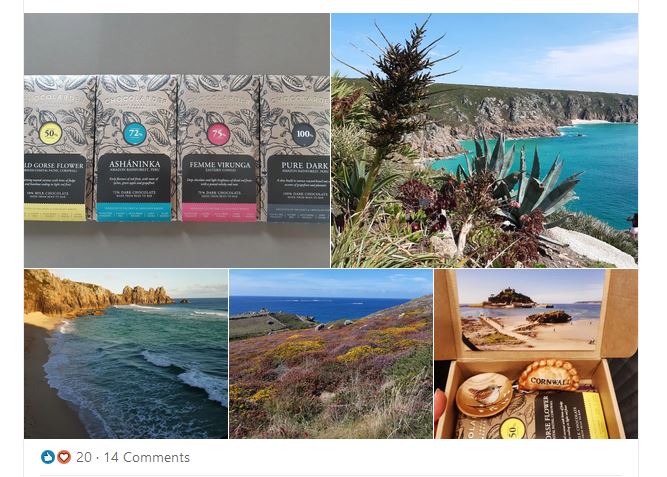
Is there some small, still not globally known chocolate-maker you would like more people to know about?
The bean-to-bar makers community is growing, and they are everywhere! I literally look for the nearest one every time I’m visiting a place. I also think it’s good to support chocolate-making in producing countries.
What is your favorite cacao origin?
This question is extremely difficult to answer, because the taste you get in chocolate depends on the cacao variety as well as each of the post-harvest processes at the farm and by the chocolate maker (fermenting, drying, roasting, grinding and conching, tempering, and even ageing which is becoming a thing in chocolate too.) Any slight change to any of these will affect the final taste and texture. I experienced that first-hand when tasting samples of chocolate liquors with different conching times. The more time, the less acidity. I love a nice acidity and fruitiness in dark chocolate, and I often find it bars made with Indian cacao. What I love with cacao is the diversity of flavour notes you can find, and I love to be surprised.
Anyway, I’ve never been able to state my favorite dish, music, tea, wine, why choose only one when you can enjoy many?
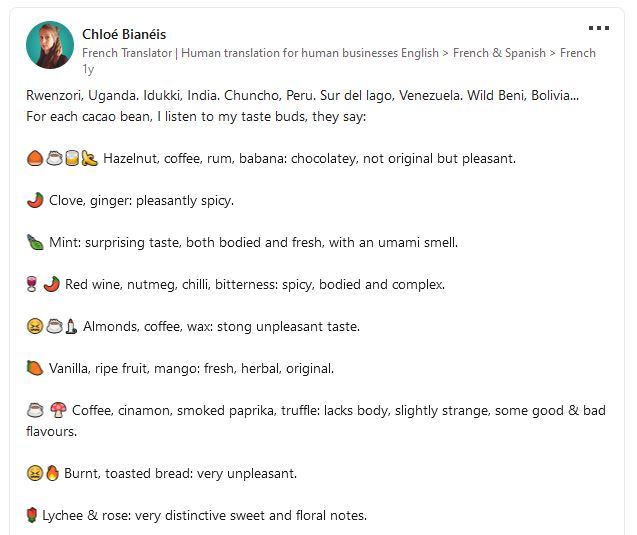
What is your favorite chocolate or cacao related quote?
Good question. I don’t know any. I just found online: “Nine out of ten people like chocolate. The tenth person always lies.”, by John Q. Tullius.
Oh wait, I also recently laughed a lot when found a great 2 pages describing the existencial crisis you go through when you discover that you picked the chocolate with « the white thing inside » in the box, in a French novel by Fabrice Caro, Le discours: «Quel cerveau malade s’est dit un matin en se levant Tiens et si on mettait un truc blanc à l’intérieur d’un chocolat dans une boîte, un truc blanc qui n’a rien à voir avec le chocolat, qui ne s’accorde absolument pas avec lui, que personne n’aime et qui suscitera chez celui qui tombera dessus une immense déception et une subite lassitude existentielle ? » And the white thing chocolate nightmare goes on for 2 hilarious relatable pages.

